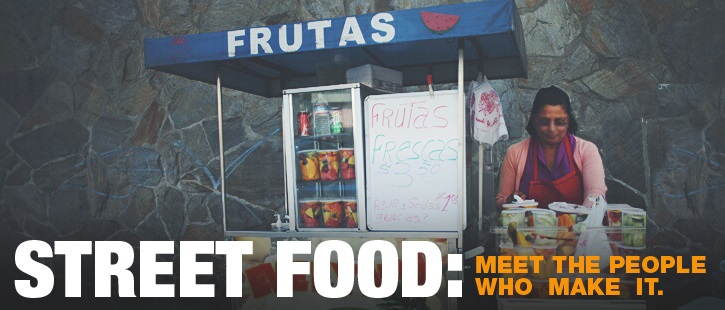
Oakland Local reports on the Bay area’s street vendors; photo courtesy of Oakland Local
Originally published by Oakland Local.
It’s 5:30 a.m., dark and cold. Even so, most of the approximately 200 street food vendors who sell in Oakland are already hard at work, shopping for their ingredients or slicing, mixing, and cooking what they will later sell to passers-by.
At this hour, many are at Jack London Square, where dozens of trucks, newly arrived from the Central Valley or the Port of Oakland are unloaded, boxes of carefully packaged lettuce, asparagus, mangoes, strawberries and more ready for buyers. Street food vendors join restaurant owners and grocers buying what they need for the day.
Miguel Montiel visits seller after seller looking for papaya, having already purchased the mango, coconut, pineapple and cucumber he needs for the 175 to 200 fruit cups he will prepare and sell that day. Twenty-one-year-old Miguel, his mother Irene, and father Miguel Sr. own and operate Evelyn’s Frutas, a mobile cart named after Miguel’s sister that they station on International Boulevard in the Fruitvale district. Sweet and juicy cactus, or tuna in Spanish, and also known as prickly pear, is the most noteworthy of the varied fruit cups they sell, often seasoned with salt, lime, and home-roasted chile powder.
“Mobile food is special because it’s authentic,” Miguel explains. “These fruit cocktails, you don’t get them anywhere else.”
Read Feeding the Street our feature article about NYC street vendors.
After gathering fresh produce for the day, street food vendors get down to the real work of preparing their dishes at licensed community kitchens, called commissaries. Hours upon hours are spent washing, cutting, and cooking before mobilizing their food carts onto avenues and plazas.
Miguel and Irene sell almost two hundred fruit cups a day, every day,except Sunday, when they sell homemade ice cream at the Laney Flea Market. A typical work day, from the market at Jack London Square to the kitchen to the street, averages twelve hours, six or seven days a week.
Irene came to this country when she was very young from Jalisco, Mexico — the same state that many street food vendors in the Fruitvale are from — and became a citizen in the 1990s when the Clinton administration granted amnesty to thousands of immigrants whose status was in limbo. The freedom of citizenship allowed her to quit her job in what she and Miguel describe as a sweatshop and start her own business selling food.
While street food vendors hail from many parts of the world, the majority of independent vendors in Oakland are documented and have the permits to sell food: a business license, a county health department permit and a business tax number, say those in the business. It’s too risky to run a business without those papers, vendors say.
“They’re going to get shut down really quickly once they’re found out, if it’s by enforcement or by complaint,” said Miguel. “Then, they have the risk of being deported, right? It’s a lot of risk more than anything.”
But there are those who work for others, hundreds who cook or maintain the carts or do other less visible tasks, who are undocumented and working their way to legitimacy to be independent business people, and to having legal status in the country.
“So the people that you see here today that have businesses are people who have gone through that whole path of coming here, not having anything, working really hard,” and eventually building legitimate businesses, said Miguel.
The legitimacy and positive image of food vending today was not the case a decade ago. Back then, when scores of new immigrants were operating vending carts illegally in Oakland and barely making a subsistence living, a Fruitvale community organizer worked with vendors to help them gain papers to make life less precarious.
Emilia Otero, who owns La Placita commissary on International Boulevard and founded the Asociación De Comerciantes Ambulantes De Fruitvale, organized vendors to push the City of Oakland to pass an ordinance allowing street food vending in certain neighborhoods under regulated conditions. It was a way to save business for them all.
Oakland’s Ordinance Establishing a Permanent Pushcart Food Vending Program was passed in 2001, becoming one of the first municipal ordinances on street food vending in the country. Otero has since founded La Placita’s Entrepreneur Program for Mobile Food Vendors to help more people get the training, permits and documentation they need.
“I get so excited knowing one day they will be vendors, knowing they one day will acquire the American dream,” she said of her work. Of those who rent space in her kitchen, “All of them who use my kitchen have permits. I am there to help them with the process and the language,” she said.
But the legal, hygienic, and quality standards of street food are enforced by the vendors themselves.
“At the end of the day, we’re just trying to look out for each other because we have the same customers almost. Everybody who lives here are the people that buy here. So if you get people sick that affects everybody,” Miguel said.
Join the national conversation about immigrant street vendors at #FoodUndocumented.
When Irene immigrated here from Jalisco, she followed her eldest sibling’s footsteps. It’s common in Oakland for Latin Americans already established here to facilitate the immigration of their family members. Obtaining workers’ permits is one of the less taxing ways to cross the border, and when looking to expand their businesses, street food vendors will often employ their family members as they pursue legal citizenship, vendors say.
Though technically their parents’ business, Miguel and his two sisters played a significant role in expanding the bandwidth of Evelyn’s Frutas. “It was almost non-negotiable to be involved in the business. I was going to school Monday through Friday, but other than that I was working, or else there was no home to come home to.” He laughs as he recollects on the sometimes challenging but very rewarding experience growing up in a family with such a strong and fruitful work ethic.
The positive attitude Miguel radiates is reflective of the street food vendors in the Fruitvale district. Among the 200 legally operating street food vendors in Oakland, the community that’s been created is one fixed in consistency and accountability.
Bits of history and tradition carry on vibrantly in the Fruitvale district, wafting with hot-off-the-griddle pupusas, freshly-steamed tamales, and distinctively spiced tacos. In a country founded in diversity and nourished with culture, it’s worth considering not only what’s provided for us, but what we provide in return.
Oakland Local coverage of street vendors is part of Street Food: Meet the People Who Make It, a partnership with Feet in 2 Worlds and In These Times. This story was made possible in part by The Media Consortium and the Voqal Fund.
Fi2W is supported by the David and Katherine Moore Family Foundation, the Ralph E. Odgen Foundation, and the Nicholas B. Ottaway Foundation.



